Library
All resources
1421 – 1440 of 2421 results

Terms of Reference – The Ethiopia Cash Working Group – November2017
Report
The Ethiopia Cash Working Group (ECWG) is a forum of stakeholders dedicated to improving the use and delivery of cash and voucher transfer programming in Ethiopia The overall objective of the group is to strengthen the coherence and quality of cash based interventions (CBIs) in Ethiopia through...
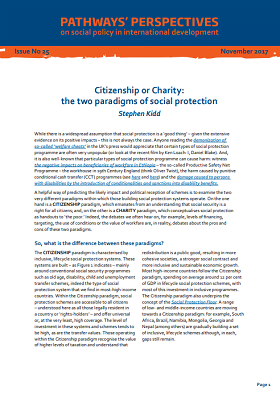
Citizenship or Charity: the two paradigms of social protection
Report
This report compares and evaluates two paradigms of social protection. Stephen Kidd explores the assumptions behind, and impacts of, the citizenship and charity paradigms he argues are at work in different contexts.

Market Systems in Libya: Assessment of the Wheat Flour, Insulin, Tomato and Soap Supply Chains
Report
The Market Systems in Libya assessment aims to provide humanitarian organisations with a better understanding of market dynamics in Libya, information on key supply chains and how they have been impacted by ongoing conflict, and the necessary foundation to examine the potential of scaling up market and...

UNHCR Multi-Sector Market Assessment (MSMA): Charcoal, water, low-income rental housing and core-relief items in Maiduguri, Jere and Konduga, Borno State, Nigeria
Report
To assess the capacity of markets to respond to cash based initiatives (CBI), including multi-purpose cash grants (MPG), the UNHCR Multi-Sector Market Assessment (MSMA) was piloted in Maiduguri Municipal Council (MMC), Jere and Konduga Local Government Areas (LGAs) of Borno State, Nigeria in July 2017....

Guidance and Toolbox for the Basic Needs Analysis
Guidelines and Tools
The Basic Needs Analysis (BNA) is a multi-sector needs analysis approach that can be applied in both sudden onset and protracted emergencies. The methodology comprises the Guidance (this document) presenting the conceptual BNA framework and related processes, and a Toolbox, which
includes tools,...

Global Framework for Action
Guidelines and Tools
This framework provides a consolidated summary of the major commitments and recommendations made to improve cash transfer programming in humanitarian response during 2015 and 2016. It aggregates the core content of: the Grand Bargain, ECHO’s 10 Principles, the High Level Panel report, the Strategic Note...
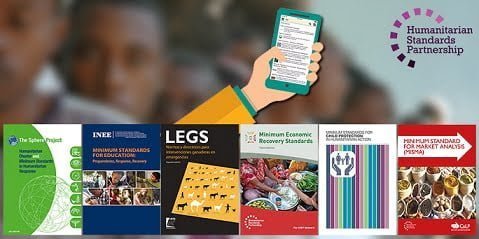
Humanitarian standards now available on mobile devices
Blog Post
The new Humanitarian Standards Partnership app (HSPapp) provides the humanitarian sector’s flagship standards and guidance in a single, free-of-charge app. Designed for field practitioners providing humanitarian aid in disaster and conflict situations, the app works on- and off-line on mobile phones and...

Harnessing Digital Technology for Cash Transfer Programming in the Ebola Response. Lessons Learned from USAID/Office of Food for Peace Partners’ West Africa Ebola Responses (2015–2016)
Report
Globally, the adoption of digital technology has grown alongside the increase in cash transfer programming (CTP), often through the use of e-transfers, in part because of the potential gains in accountability, efficiency (cost and time) and effectiveness. The 2015 High Level Panel on Cash Transfers...

Final Evaluation of the DiRECT Response Emergency Cash Transfer Programme in Zambia
Report
In the past two years (2015 and 2016), Zambia experienced relatively harsh climatic conditions characterised by disruptive rains and the negative impact of El Nino weather patterns. Districts in the southern and western regions of the country were most affected. Many farmers in the affected regions were...

How We Built a Global Action Agenda to Enable Digital Payments in Humanitarian Response
Blog Post
In recent years, digital payments have emerged as an essential, high-impact tool for humanitarian response. They can enable humanitarian responders to quickly reach people with assistance, and in ways that provide both short- and long-term benefits to those in need, such as access to safe and portable...
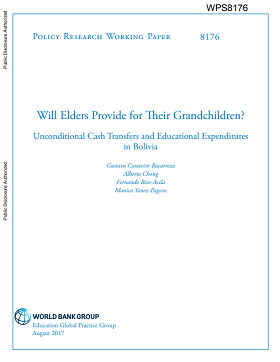
Will Elders Provide for Their Grandchildren? Unconditional Cash Transfers and Educational Expenditures in Bolivia
Report
This paper takes advantage of repeated cross-section household surveys and a sharp discontinuity created by the introduction of an unconditional cash transfers to elders.The paper evaluates the impact of these cash transfers on the educational expenditures for children within a household. The analysis...

Conflict-sensitive Cash Transfers: Unintended negative consequences
Report
Risks associated with cash transfer programmes in fragile contexts include theft, diversion, corruption, security, targeting, misuse by beneficiaries and inflationary effects. However, the literature indicates that – while different – these risks are no greater than those associated with other forms...

Libya Cash and Markets Working Group (CMWG) Advocacy and Communications Plan
Report
The Libya Cash & Markets Working Group (CMWG) Strategic Framework & 2017 Workplan outlines ‘communication and advocacy’ as a ‘deliverable’ for supporting ‘HC/HCT decision making’.
Throughout March & April 2017, the CMWG Steering Committee used a series of tools as part of a seven-step process...
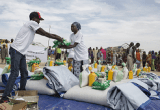
Emergency Response Programming – New Market-Analysis Skills Training Available [Eng/Fr/Arabic]
Blog Post
Market analysis is a core part of the suite of assessments that should help to inform all emergency response programming – these new courses will ensure you’re fully equipped with the knowledge you need to consider and work through local markets whenever possible.

Ethiopia Cash Working Group: Minutes of the CWG Meeting Tuesday, 25 July 2017
Report
The main purpose of the meeting would be to reach an overall
agreement on the approach taken to determine Minimum Expenditure Basket (MEB) and to take advantage of the World Bank representative to discuss PSNP and humanitarian linkages in determining both MEBs and agreed upon transfer values.
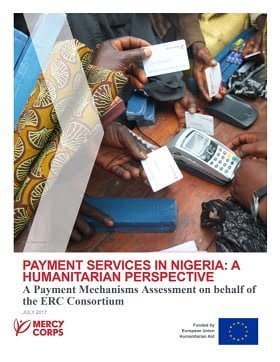
Payment Services in Nigeria: A humanitarian perspective
Guidelines and Tools
This assessment was conducted as one component of a broader inter-agency exercise to inform the use of Multi-Purpose Grants in Nigeria. As such, it examines the financial services landscape in Nigeria, in order to support the review and selection of financial service providers (FSPs) for the delivery of...

Global Cash Forum
Report
This report summarises current developments in Cash Transfer Programming (CTP), as captured at the recent Global Cash Forum, held in Geneva in June 2017. In recent years, CTP has emerged as one of the most significant innovations in humanitarian response. Major donors and agencies have made public...

Discussion Note: Building Evidence and Developing Guidance on Operational Models for CTP
Report
This discussion note summarises the CALP Network’s proposed approach to developing guidance for donors and operational agencies to assess the suitability of different operational models for CTP, by context. The note lays out the current debate relating to different forms of collaboration for CTP, and...

Organizational Cash Readiness Assessment: Project Concern International and Relief International Case Study
Case Study
The CALP Network partnered in 2016 with two organizations, Relief International (RI) and Project Concern International (PCI), to support them through a six-month process to strengthen their organizational readiness to deliver cash or voucher programming, using CALP’s Organizational Capacity Assessment...

Walking the talk: The Grand Bargain & Cash Transfer Programming
Blog Post
Cash Transfer Programming (CTP) is here to stay. The political battle has been won – cash is now accepted as part of the humanitarian response toolkit, and the will to increase its use is there. Now we need to bring this will to life, and turn our commitments into action.